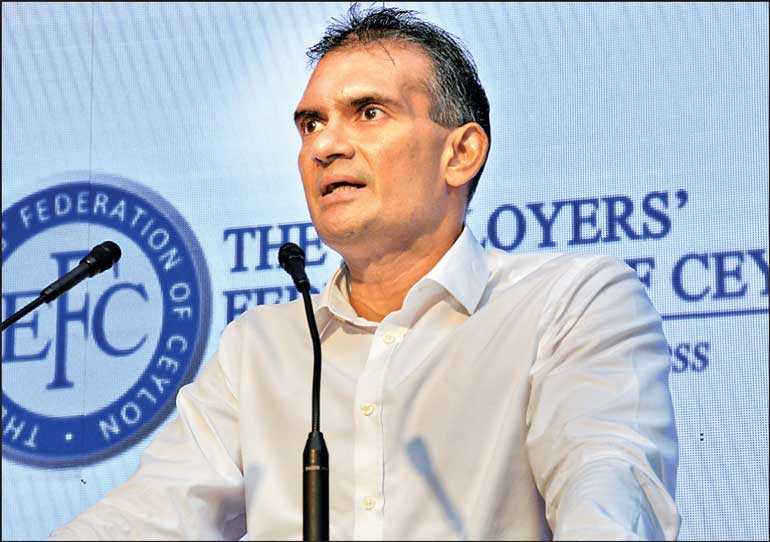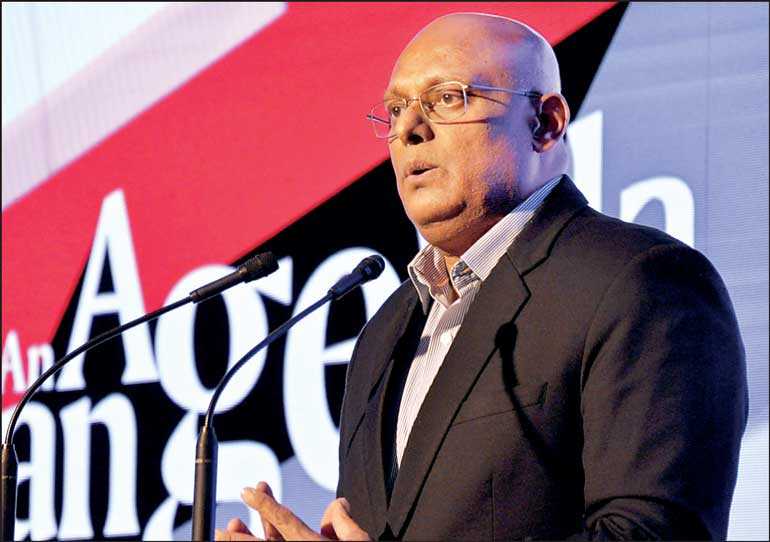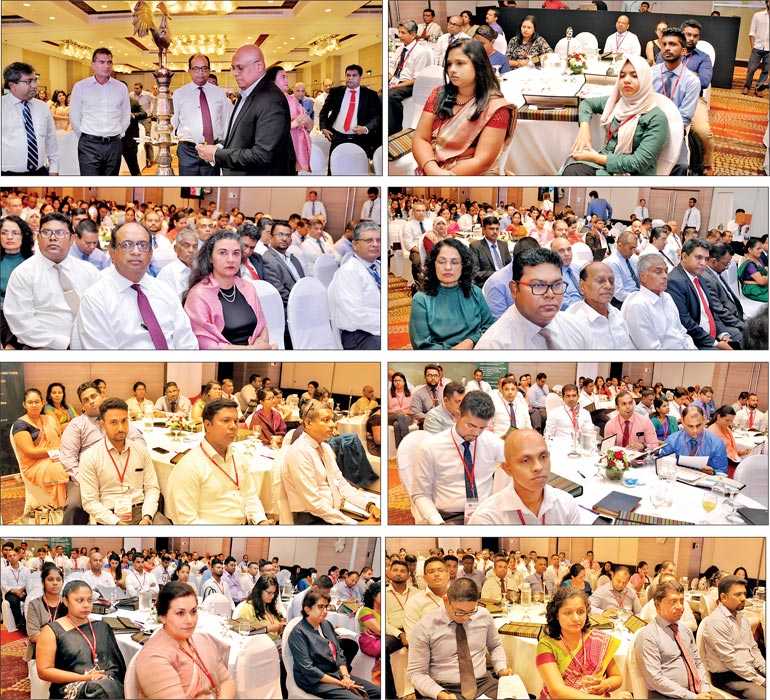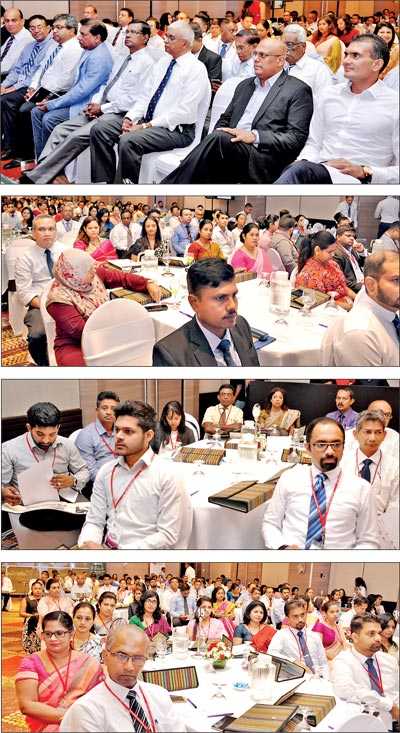Monday Feb 16, 2026
Monday Feb 16, 2026
Tuesday, 19 November 2019 00:00 - - {{hitsCtrl.values.hits}}



 By Madushka Balasuriya
By Madushka Balasuriya
Albert Einstein once said: “The world as we have created it is a process of our thinking. It cannot be changed without changing our thinking.” It was a sentiment similar to this which Suresh Shah, the immediate Past President of the Employers’ Federation of Ceylon (EFC) centred his keynote address around, as he spoke at the eighth edition of the EFC’s annual symposium held in Colombo recently, the theme of which was ‘An Agenda for Change’.
In a wide-spanning address Shah touched upon several facets of society and world of business where change will be inevitable, whilst simultaneously highlighting the change that is already taking place.
From climate change to renewable energy to trade liberalisation to exponential shifts in technology to rethinking workforce composition, in an engaging 30-minute speech Shah laid out in no uncertain terms the path that needed to be followed in Sri Lanka was to fulfil its vast potential.
He also set the tone for the rest of the symposium, which would focus on three critical pillars: ‘Social Dialogue and Building Trust’, ‘Sustainable Enterprises’, and ‘Shifting Paradigms of the Workplace’.
Social Dialogue and Building Trust
A key aspect of building trust in the workplace is cooperation. But in this day and age, there is a clash of cultures taking place. Baby boomers are having to fast accept the reality that millennials and Gen-Z’ers are accounting for larger and larger percentages of the workforce – and they want to do things differently.
“The emerging generation, will be far more mobile than in the past, they will switch jobs, they will switch professions, and they will even switch countries,” says Shah.
“I have a young son, 24 years old. He got a very nice job in this big company and one day he came about two years into his job and he told me ‘I’m not interested in the corporate world. I do not want to work when people tell me what time to come and go, and when there are so many rules and regulations’. This is the new emerging generation.”
For Shah, these are non-negotiable aspects that organisations need to consider and factor in when building an organisational culture in the future.
“Because 20 years from now, it’s not us that are going to be sitting in these companies. It’s going to be today’s 20-year-old kid, and the way they look at the world is extremely different from the way that we see it.
“Young generation is seeking much more than a salary. Keen to see fit between their own values and that of the organisation. They want flexible hours, healthy food in the canteen, and of course places to chill out. Believe me, we are redesigning our office at this moment in time, and we are creating chill out spaces for the young kids who work with us.”
Further to this Shah also points out that the composition of the workforce is also changing from a gender standpoint, and he urges companies to move with the times and make the necessary structural changes to accommodate the changing demographics of the modern workplace.
“We will attract more females into the workplace, but is our corporate infrastructure sufficient to incorporate the gender balance?” He asks, leaving the question hanging in the air for further contemplation.
Shifting Paradigms of the Workplace
On the topic of the workplace, Shah also made note of the fact that the very definition of ‘workplace’ is now something that is changing drastically. As he explains, “the home and the workplace need not be in close proximity anymore”.
“I know this young guy who lives in Sri Lanka, who very recently got a full-time employment job out of a company in the US. Now this is not a call centre job, it’s not where he has to go into some office and he has to do work from 8-5. But he sits at home and works for a US organisation. That’s thousands of miles away and he gets paid on a monthly basis. So this is the way that work will evolve.”
Further to this Shah is at a pains to point out some of the more drastic changes that employers and employees alike need to prepare for going forward. Citing a recent study by McKinsey Global Institute (MGI), recently named the number one private-sector think tank in the world, Shah reveals that some 60% of occupations have at least 30% of work content that can be automated, while 43% of the jobs that exist today will be automated out of existence by 2030.
The study goes on to state that between 400 million to 800 million jobs will be lost due to automation by 2030. Though this will be countered by the creation of between 500-900 million new jobs during the same period. So what does this mean?
“This means there will need to be retraining. McKinsey estimates that about 375 million people will need to be retrained in terms of the skills that they have today. The World Economic Forum estimates that 65% of children entering primary school today will work in jobs that today do not exist. That is the pace of change that we need to deal with.
“Jobs of the future will be creative jobs, relationship-based jobs, and jobs with unpredictable content. People will also seek greater work-life balance.”
Speaking directly to the Human Resource (HR) professionals in the audience, Shah urged them to revaluate the skills which they look for in potential employees. In the future, says Shah, soft skills such as collaboration, data literacy and problem-solving are going to be far more valuable than the technical skills present-day employers value the most. “Specialisation is not good enough. We need to look at different skills, soft skills. We need to look at a breadth of skills in terms of recruitment, succession planning. Technical skills are easy to teach, soft skills are not.
“If you have the people with the right attitude retain them as best as you can even in the context of the younger generation.”
Sustainable Enterprises
In terms of the global economy and where future opportunities lie, Shah was unequivocal in his position that addressing climate change was the one major factor that all industries should be restructuring their focus towards. This, he said, held the potential to truly reinvigorate and realign the global economic landscape.
“Climate change has impacted our globe for quite some time, and it is estimated that by 2030 the temperature on earth will increase by 1.5 degrees. Now this doesn’t sound like much but from a global context when you speak of 1.5 degree change that apparently is rather significant.
“With the use of renewable energy increasing around the world, the power that the Middle East has today because of the supply of fossil fuels will diminish. Just imagine the Sahara and Africa, they may end up being the world’s premier supplier of energy through the use of renewable solar.”
Sustainability is also something Shah looks at as critical in terms of the workplace and organisational building. This is particular pertinent in terms of Sri Lanka and its workforce. As Shah bluntly points out, there are “too many people in agriculture”.
“27% of our population is in agriculture, and they contribute only about 7% to GDP. You can straightaway see the disparity and that there is a lot of poverty in the agriculture sector. And whatever you do you can’t bump up agriculture’s contribution to GDP beyond maybe about 10%, that’s about the max you can get.
“So you still can’t have 27% of the population contributing only 10% to GDP, you need to cut that down. You need to bring that down to possibly 15% or even 12% of our population. But they need to be accommodated in some kind of work, some kind of productive and sustainable work. And for this we need to create investment in this country.”
Investing in Sri Lanka
According to Shah, if there is just one thing that the country needs to focus on going forward it’s to raise exports to at least 100% of imports.
“Unless we do this, we will constantly hit forex challenges if we don’t change this balance. We’ve gone through the cycle a number of times and we will repeat it in the future if we don’t change the import/export balance in our country.”
For this to happen however, the private sector needs to compete at a very different level, says Shah.
“In the past – and I’m not very popular when I say this but this is the reality – the success in the private sector has been because of protection. Protection in this form is defined as high import tariffs, and preventing foreign investment into our economy. This is how we have defined protection in the past, and if we continue to define protection in this form we will not be able to compete in the global markets.”
Indeed, Shah wants to redefine protection. Drawing on examples of the successes on some of the world’s largest organisations such Apple, Google and Amazon, all of which were able to flourish in completely free market economies, Shah believes protectionism needs to be redefined as sustainability.
“They survived because they were competitive, productive and aggressive, and because they were creative and innovative businesses. We need to define protection as sustainability, if not we will not be sufficiently geared to meet the competitive challenges ahead.”
Alongside this, if Sri Lanka is then able to capitalise on shifting power dynamics in the global economy from the West to Asia, Shah believes that will prove the necessary launching pad for Sri Lanka’s economy.
“We are now seeing a shift in economic power from the West to Asia and Africa. With the use of renewable energy enhancing around the world, the power that the Middle East has today because of the supply of fossil fuels will diminish. Just imagine the Sahara and Africa, they may end up being the world’s premier supplier of energy through the use of renewable solar.
“Also, the shift off economic power from the West into Asia will be driven by fundamentally two countries, in India and China. Go back a few years and think of the advantages that Hong Kong and Singapore had being in very close proximity to two large trading blocs; Hong Kong to China and Singapore to ASEAN. Now Sri Lanka being in such close proximity to India, this is an opportunity that we should not lose.”
Pix by Lasantha Kumara